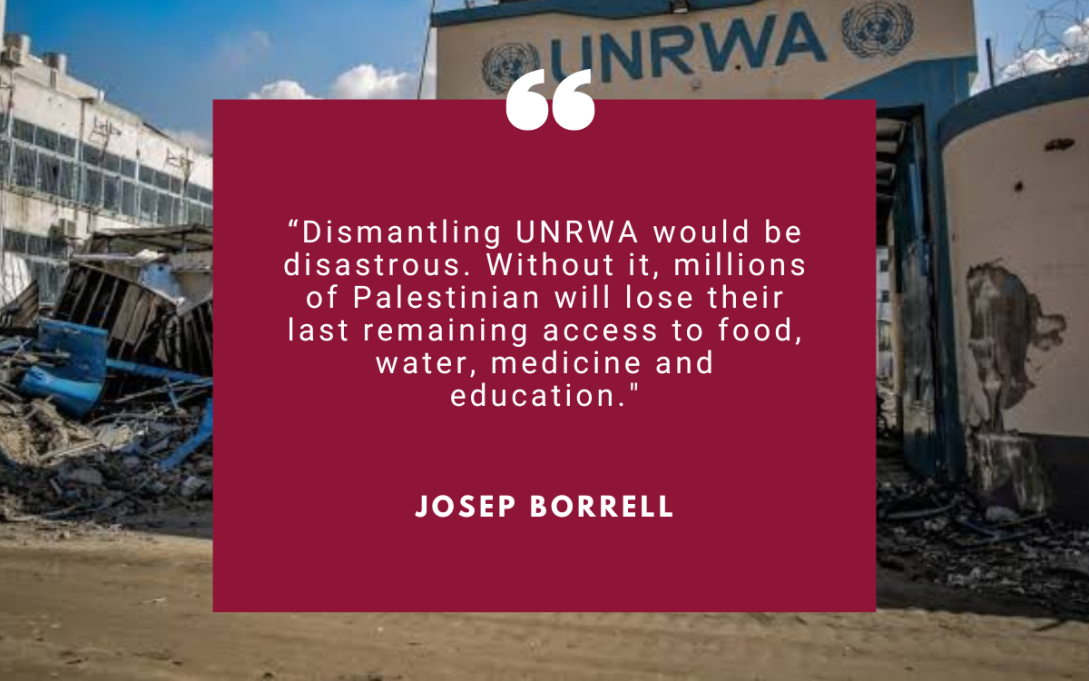The future of UNRWA is a test of our humanity

As the worst humanitarian crisis in the history of the Gaza strip since 1948 is unfolding, the Israeli Parliament has adopted laws to make the operations of UN agency for Palestinian refugees in Gaza all but impossible. The laws ban the agency’s operations within Israel, including in the illegally annexed Palestinian territory of East Jerusalem, where UNRWA has its headquarters.
This legislation stands not only in stark contradiction to international law and the rules-based world order, but also to basic principles of humanity. It comes after a year of disregard for UNRWA staff, premises and humanitarian operations in Gaza. At least 237 UNRWA personnel have been killed since 7 October 2023 and over 200 UNRWA premises have been damaged or destroyed, killing more than 560 people seeking UN protection.
The ban also comes at a time, when UNRWA’s services are more needed than ever. “The entire population of north Gaza is at risk of dying”, Joyce Msuya, acting UN Under-Secretary-General for Humanitarian Affairs, warned last week. This is not hyperbole. The IPC, an organisation tracking food insecurity, predicts that if nothing changes, some 345,000 people in Gaza will in the coming month reach the highest level of starvation: at least 10 days without having a meal. This is the point, at which people begin to die from hunger.
The North of Gaza has been completely cut off from the rest of the territory. There are daily reports of destroyed UN shelters, severely damaged hospitals, and families being separated, with men and boys taken away by the truckload. Israeli forces have ordered the remaining estimated 400,000 residents of Northern Gaza to evacuate yet again, but many have nowhere to go after repeated displacements. They are trapped among airstrikes and hunger.
Dismantling UNRWA at this critical time will be disastrous. The Agency, with its network of ware-houses and staff, is the backbone of aid distribution in Gaza. Without it, civilians will lose their last remaining access to food, water, and medicine.
One day, we will be asked: "Where were we Europeans while people were besieged and starved in Gaza?" Our response should not echo our silence but instead speak of the actions we took to safeguard UNRWA, the last lifeline for many Gazans.
Earlier this week, the members of the UN Security Council expressed grave concern over legislation adopted by the Israeli Knesset and strongly warned against any attempts to dismantle or diminish UNRWA’s operations and mandate, recognising that this would have severe humanitarian consequences for millions of Palestinian refugees. All 27 EU Member States also condemned any attempt to abrogate the 1967 agreement between Israel and UNRWA or to otherwise attempt to obstruct its capacity to operate its mandate.
No other international or regional organisation has the infrastructure, local knowledge, or capacity to replace UNRWA's life-saving services in Gaza. In the occupied West Bank, UNRWA’s collapse would deprive Palestinian Refugees of access to education and healthcare, greatly worsening an already dangerous situation.
UNRWA was created by the UN General Assembly in 1949. Its continued existence 75 years later is the direct consequence of the fact that the Israeli-Palestinian conflict has never been resolved. The agency’s collapse would unilaterally change the parameters of any future political settlement to the Israel-Palestine conflict, undermine Palestinians’ right to self-determination and make finding a political solution even more difficult.
The Israeli government has tried for years to discredit UNRWA. In March 2023, it claimed that approximately 10% of the agency's 13,000 employees in Gaza are affiliated with Hamas or Islamic Jihad, without providing evidence to substantiate these claims.
The EU and the United Nation have taken those claims very seriously. A UN investigation found that nine staff members may have been involved in the 7 October terrorist attack. The Agency immediately terminated their employment and subsequently strengthened its security measures. In parallel, an audit asked for by the EU and led by former French Foreign Minister Catherine Colonna found that UNRWA has a more robust neutrality framework than any comparable organization. It also found that UNRWA remained "irreplaceable and indispensable" in the region.
Banning UNRWA will not terminate the refugee status of Palestinians, which exists independently of UNRWA. And it will not contribute to a safer future for the people of the region. Only a political settlement can bring security and peace to Israelis, Palestinians.
It is high time to end this war, free the hostages, ensure the unimpeded access of humanitarian aid to Gaza, and end the destruction of public infrastructure in the West Bank. And it is high time to finally put an end to the illegal occupation of Palestinian territories - as asked for repeatedly by the UN Security Council and the UN General Assembly and ordered recently by the International Court of Justice (ICJ).
Advocating for the demise of UNRWA confuses cause with consequence. UNRWA's mission will end once a sovereign Palestinian state, living peacefully side-by-side with Israel, has been established.
MORE FROM THE BLOG

"Une fenêtre sur le monde" - Blog du HR/VP Josep Borrell
Blog de Josep Borrell sur ses activités et la politique étrangère européenne. Vous pouvez également y trouver des interviews, des articles d'opinion, une sélection de discours et de vidéos.
